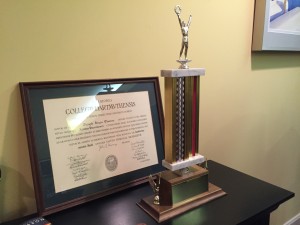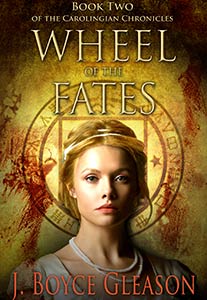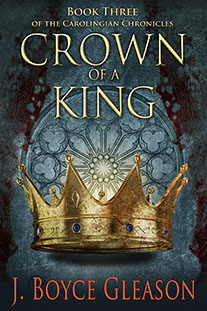I got my life-long wish during my freshman year in high school. I made the football team.
Although at thirteen I was technically  ineligible to play, I could practice with the team until my fourteenth birthday in November and still play the last two games. I can still remember putting on my pads like they were plates of armor and heading out to the dusty field behind our high school. The start of practice always began the same way: the varsity and junior varsity ran through a defined set of calisthenics. Set up in eight rows of ten we barked out the count for each exercise, mimicking the movements of senior Captain Mike O’Hagan.
ineligible to play, I could practice with the team until my fourteenth birthday in November and still play the last two games. I can still remember putting on my pads like they were plates of armor and heading out to the dusty field behind our high school. The start of practice always began the same way: the varsity and junior varsity ran through a defined set of calisthenics. Set up in eight rows of ten we barked out the count for each exercise, mimicking the movements of senior Captain Mike O’Hagan.
If Mike put his hands to his helmet and yelled, “Hunh,” we put our hands on our helmets and yelled, “Hunh!” If he clapped his hands and slapped his thigh pads to a syncopated beat, so did we. To adolescent boys, the percussive rhythm to this routine resonated with astounding power. We were part of something bigger and far cooler than ourselves. It was awesome.
I had two older brothers on the squad, Jim and John. I was not alone in this privilege. Briarcliff Manor had a number of families that produced children at a prodigious rate: the McCloskeys, the Borhos, the O’Hagans, the McFaddens, the Kennedys…at six kids, the Gleasons were considered a mid-sized family.
That year, my brother Jim was a senior and he had the distinction of being the most valuable player on the team. I know this, because he has a trophy to prove it.
We didn’t receive too many trophies back in those days. I think I had one from a third place finish in a basketball tournament from my sixth grade youth league. It was about an inch tall and little more than a tiny basketball on a tree stump. It was the only recognition I had ever received for sports throughout my childhood.
Jim’s trophy by comparison was twenty-four inches tall, a golden pilaster rising from a marble base. On its top, it featured a football player in mid-throw. It was awarded in front of the entire high school community on senior recognition day in the last week of school. Jim won it for playing fullback.
He didn’t always play at that position. In a surprise decision by Coach Ed Hoffman, Jim was moved from guard to fullback his senior year. At 220 lbs., he was a bruising blocker. In one of the first games of the season, he knocked out two defensive ends in successive plays. The game took forever to finish as the town only had one ambulance and we had to wait for it to return for the second injured boy. As the season unfolded, Coach Hoffman discovered that Jim could also carry the ball and my brother began to rack up 100+ yard games.
In hindsight the move to fullback was obvious. Briarcliff’s offensive line that year was huge. Anchored at center by Mike O’Hagan, the line featured two gargantuan tackles, Mike’s brother Gary and Scotty Mickelson, it also included my brother John and an uncharacteristically large sophomore named Deryl Seemayer.
In a huge upset, Briarcliff beat Pleasantville near the end of the season to clinch the league title. Pleasantville was a powerhouse of a team that hadn’t been beaten in nearly three years. The day after the game there was a front-page picture of Jim in the Citizen Register barreling through the Pleasantville defensive line to score the winning touchdown.
To my thirteen year-old mind, my brother had set a high bar for a perfect season: Play fullback, beat Pleasantville, lead the league and win the trophy.
I planned to achieve all of them.
For the next two and a half years, I dedicated myself to becoming the best football player in the school. I lifted weights year round, ran extra sprints after every practice, learned the playbook by heart and ate voraciously to gain weight.
Unfortunately, my senior year left a lot to be desired.
I didn’t play fullback. We didn’t win the league. (We didn’t even have a winning season). We lost to Pleasantville. And while there were many reasons why none of these things happened the way I had it planned, the hard truth always remained. I had failed. And if there was one thing I hated most in life, it was failure.
There was only one chance left for redemption: the trophy for most valuable player. Unfortunately, I had to wait until the last week of school to find out if I’d won it.
Months rolled by. Fall became winter. Winter became spring. College acceptance letters arrived. Our futures began to stretch out in front of us. The last week of school brought all the usual pomp and circumstance and with it came senior recognition day. I waited in the stands as the coaches went through the superlatives for each sport. The last sport recognized was always football and Coach Hoffman stood to award the prize. In his hand was the twenty-four inch golden trophy that my brother had won. I held my breath.
“This player is an exemplary young man,” Coach Hoffman began, but I couldn’t hear the rest because the sound of my heartbeat drowned out the pre-amble to the winner’s name. He stopped to give the award the appropriate drama it deserved.
“This year’s most valuable player award goes to…Bobby Kennedy.”
I stood to applaud with all my classmates, our parents and the entire school community. Bobby was one of my best friends. I was happy for him, but like everything else I had planned for that year, I had failed. I had to recognize that I just didn’t deserve it.
The final trophy of the day was the American Legion Sportsmanship Award. As Coach Hoffman began his soliloquy for it, a sense of dread stole into my mind. Before he even announced my name, I knew it was my consolation prize. I groaned.
Sportsmanship. The nice guy. The guy who congratulates the winner. I couldn’t stop thinking of Vince Lombardi. “Winning isn’t everything. It’s the only thing.”
I was furious. With cheeks burning, I strode to the podium to accept the trophy. Sportsman that I was, I shook Coach Hoffman’s hand and smiled and waved to acknowledge the audience applause. But, in my heart, I was dejected. I had failed four for four. I went home, put the trophy in a box and set my mind on college.
Many years later, I was reminiscing with my older brother Jim about his senior year in high school. We talked about their safety, “Radar Rick” Webber and the team’s halfback, Ross Connolly.
“You know what I really regret?” Jim said.
I shook my head. I couldn’t think of a thing he might regret.
“I didn’t win the Sportsmanship Award my senior year.”
“But, you were Most Valuable Player.”
“Yeah, but the Legion trophy was always the big prize. That’s why it’s awarded last. Mike O’Hagan won it my senior year. I was really pissed off about that.”
It took some time for my adult brain to convince my adolescent brain to step aside so I could look at those events from a different perspective.
As an adult, I had brought my competitive nature to work. And over the course of my career, I succeeded and failed many times. Hard work, I found, was a precursor to success, but did not guarantee it. There were times when my best work was in the worst of my failures.
I took pride in giving a good day’s work for a good day’s pay and tried to align myself with people who brought the same enthusiasm to their jobs as I did. I treated people with respect, regardless of their job title or importance to me. I valued trust and competency and ethical behavior and was rewarded in kind by those who held similar standards.
Success has its merits (it really does), but when I think back on it, how we succeed is just as important. There is something to being able to live with the person you see in the mirror.
I have won many accolades and awards over the course of my professional career but only one trophy sits by my desk these days. It’s from American Legion Post 1054. A golden pilaster rises twenty-four inches up from a marble base. And on its top stands – not an athlete – but a human being.


